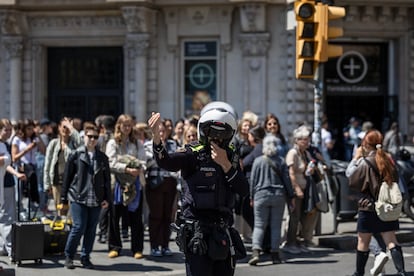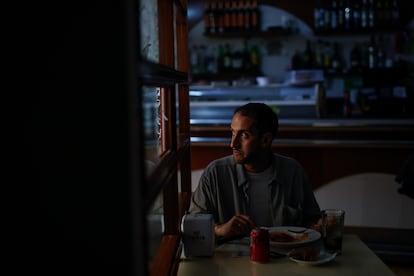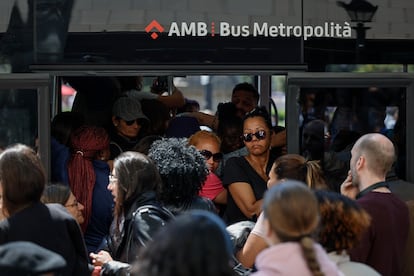Blackout in downtown Barcelona: ‘This is the end of the world already, isn’t it?’
Hundreds of travelers were trapped in the city’s subway while officers tried to direct traffic

The widespread blackout throughout Spain and in several European countries has had serious effects on mobility and communications. In the case of Catalonia, the railway lines have suffered cuts due to the lack of electricity supply, both in the conventional and high speed networks. In Barcelona, the subway has been blocked, leaving hundreds of people trapped inside the cars.
Traffic has also been impacted. The blackout of thousands of traffic lights has caused cars, motorists and pedestrians to move practically blind, with no one knowing who has the right of way. In the dense district of Eixample, with heavy vehicle traffic, drivers pile up at intersections waiting for vehicles on perpendicular streets to cross or give way to them. Everyone stops at the traffic lights that are out to make sure there is no traffic coming from the perpendicular street, preventing a side collision, while pedestrians take advantage of the traffic jams in many streets to cross between stationary vehicles. “This is the end of the world already, isn’t it?” a driver on Aragon Street says sarcastically as he tries to turn on the radio in search of news.
Precisely on that street, Gerard Ibáñez, 37 years old, is directing traffic at the intersection with Urgell. He says he told a city officer that the traffic chaos needed to be managed, and when they ignored it, he took it upon himself to either allow or prevent vehicles from passing, as the traffic lights aren’t working. “Someone has to do it, do you know what this is like?” he says while letting cars coming up Urgell pass, receiving some shouts of gratitude. “I could really use a whistle!” he says, while his electric scooter rests 20 meters away.
Traffic on Passeig de Gràcia, one of the main arteries of the Catalan capital, erupted into chaos as soon as the traffic lights turned off. The Guardia Urbana deployed several patrols to manage traffic with whistles at especially sensitive points, such as the junction with Gran Vía or Plaza Cataluña and Tetuán. Shops that are usually bustling with people throughout the day chose to evacuate customers and close their doors, such as Zara, Nike, and the FC Barcelona store very close to the building that houses the Barcelona Stock Exchange. At El Corte Inglés in Plaza Cataluña, a seven-story shopping center, the public was still allowed to enter, despite the stores barely having any light inside.

The city bus has continued operating, despite the fact that the information screens at the stops have been turned off. Staff from Transports Metropolitans de Barcelona (TMB), Renfe, and Adif have prevented access to train and metro stations, which have turned into dark, inert caves. Metro sources reported that at the time of the blackout, there were 24 trains in the tunnels of the network.
Tourists are moving uneasily along Passeig de Gràcia, even unaware of the attractions of Gaudí’s Casa Batlló, which is usually a hotspot for crowds on the sidewalk. The urban guards have had to take on guiding roles in many cases, trying to provide explanations for an event that has raised far more questions than answers.
A taxi driver driving around the streets of Barcelona with his light on says he’s been like this for an hour because his card reader isn’t working and he only wants to take a passenger who will pay cash. “Sorry, but only if you have cash.” He is not the only one. Just ahead, a woman waits inside another cab, waiting for her driver’s pay terminal to have coverage and to be able to pay.

Juan Carlos León, 49, was caught by the blackout at the gates of Sants station, where he was determined, as he does every day, to take a train to Badalona. When he was told that it would be impossible due to the chaos and convinced of what was coming, he went into a store and bought a survival kit. “I got a battery-powered radio, some headphones, batteries, and two candles,” he says, still holding the change from his purchase.
Outside the capital, there was a collective holding of breath in areas like Tarragona, where the largest petrochemical hub in southern Europe operates, and where there are three nuclear facilities: two reactors in Ascó and one in Vandellòs. Repsol has reported that the electrical issue has not affected its facilities.
Tu suscripción se está usando en otro dispositivo
¿Quieres añadir otro usuario a tu suscripción?
Si continúas leyendo en este dispositivo, no se podrá leer en el otro.
FlechaTu suscripción se está usando en otro dispositivo y solo puedes acceder a EL PAÍS desde un dispositivo a la vez.
Si quieres compartir tu cuenta, cambia tu suscripción a la modalidad Premium, así podrás añadir otro usuario. Cada uno accederá con su propia cuenta de email, lo que os permitirá personalizar vuestra experiencia en EL PAÍS.
¿Tienes una suscripción de empresa? Accede aquí para contratar más cuentas.
En el caso de no saber quién está usando tu cuenta, te recomendamos cambiar tu contraseña aquí.
Si decides continuar compartiendo tu cuenta, este mensaje se mostrará en tu dispositivo y en el de la otra persona que está usando tu cuenta de forma indefinida, afectando a tu experiencia de lectura. Puedes consultar aquí los términos y condiciones de la suscripción digital.








































